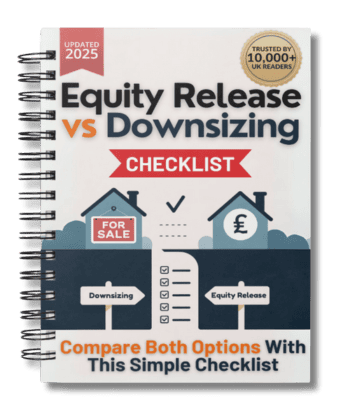
Top 10 Equity Release Companies in the UK (2025 Review)
See How Much You Could Release
In Just 60 Seconds — No Fees, No Obligation.
How Much Could You Unlock?
Why Homeowners Trust Us
Try Our Free Equity Release Calculator
Quick, Safe Estimate

No Commitments

No Hidden Fees
Trusted by Over 20,000 UK Homeowners!
 Be aware. Equity release comes with drawbacks which are important to think about. Lifetime mortgages are secured loans. Compound interest means the amount you owe can grow quickly. Equity release reduces your estate's value and may impact means-tested benefits.
Be aware. Equity release comes with drawbacks which are important to think about. Lifetime mortgages are secured loans. Compound interest means the amount you owe can grow quickly. Equity release reduces your estate's value and may impact means-tested benefits.Key Takeaways:
- Top providers backed by trust and regulation - leading equity release companies like Aviva, Legal & General, and More2Life are FCA-authorised and members of the Equity Release Council, ensuring consumer protection and product standards1.
- Choose based on your goals - prioritise features like lowest APR, flexible repayments, or inheritance protection depending on your retirement objectives2.
- Understand full lifetime costs - it's not just about initial interest rates, consider early repayment charges, how interest compounds over time, and any limitations on moving or leaving an inheritance3.
Choosing the right equity release provider is one of the most important financial decisions for homeowners aged 55 and over in the UK.
According to the Financial Conduct Authority, more than 100,000 lifetime mortgage sales were recorded in 2022, showing just how many people are turning to equity release in later life4.
With so many options available, there are major differences in interest rates, repayment flexibility, and features such as inheritance protection.
Choosing the wrong provider can result in costly penalties and limited options for the future.
In This Article, You Will Discover:
This guide will help you navigate the equity release landscape by comparing the leading providers in 2025, outlining key features to evaluate, and flagging common pitfalls to avoid.
You will gain the clarity and confidence needed to make a secure decision for your retirement.
What Is Equity Release and How Does It Work?
Equity release allows homeowners to unlock tax-free cash from their property without having to move. The two main types are:
- Lifetime Mortgages: Borrow a portion of your home’s value, with interest rolled up or paid monthly. The loan is repaid when the property is sold, typically after death or moving into long-term care.
- Home Reversion Plans: Sell part or all of your property to a provider in exchange for a lump sum or regular payments, while retaining the right to live there rent-free for life.
Eligibility usually requires you to be at least 55 (60 for home reversion), own a UK property worth at least £70,000, and have repaid any existing mortgage.
How It Works
- A qualified adviser assesses your needs and a surveyor values your home.
- You receive a personalised offer based on your age, property value, and loan type.
- You can take a lump sum, draw down funds as needed, or combine both.
- Interest is either paid monthly or added to the loan, compounding over time.
- The loan is repaid when your home is sold, usually after death or long-term care placement.
Why It Matters
Over 95% of equity release customers in the UK choose lifetime mortgages, making them the dominant product in this space8.
Understanding how these plans work is essential to avoid costly mistakes and to choose a solution that aligns with your long-term financial and family goals.
How Can You Compare Equity Release Plans Effectively?
How to Compare Equity Release Plans Effectively
Comparing plans goes beyond just the interest rate. Consider these key factors:
Interest Rates and Market Ranges
Rates in 2025 typically range from 5.95% to 7% (MER), with the lowest rates for older applicants and higher-value properties. Always compare both the APR and MER to understand the true cost.
Early Repayment Charges (ERCs)
ERCs can be significant—up to 25% of the loan balance if you repay early or move home outside protected terms. Look for plans with flexible, ERC-free voluntary repayments.
Flexibility and Features
Modern plans often allow penalty-free partial repayments, drawdown facilities, and inheritance protection. These features can help you manage costs and preserve more equity for your heirs.
Loan-to-Value (LTV) and Maximum Borrowing
LTV ratios vary by age and provider, typically from 27.5% at age 55 up to 60% for older applicants or enhanced plans.
Regulatory Guarantees
Choose providers that meet Equity Release Council standards, including the No Negative Equity Guarantee and the right to move home or downsize without penalties.
Read More: Exploring Equity Release Setup Costs

Structured Comparison Checklist
Use this as a quick-screen template:
| Comparison Area | Key Questions to Ask |
|---|---|
| Rate & Cost | What is the APR? Is it fixed? Are there setup fees? |
| ERC & Overpayments | How much can you repay annually without penalty? |
| Loan-To-Value (LTV) | What % of your home value can you release? |
| Flexibility & Features | Can you draw down, move home, or protect inheritance? |
| Regulatory Guarantees | Does the provider meet ERC standards (like No Negative Equity)? |
| Provider Reputation | What are their Trustpilot, FCA complaint stats, and awards? |
Making side-by-side comparisons using your own numbers will help you see which plan offers the best fit across critical priorities, like cost-efficiency, flexibility, and long‑term protection.
Who Are the Best Equity Release Providers in 2025?
The top providers in 2025 are all FCA-authorised and members of the Equity Release Council, ensuring high standards of consumer protection. Here’s a closer look at the leading names:
| Provider | Key Features & Strengths |
|---|---|
| Aviva | Largest UK provider, flexible lifetime mortgages, competitive rates, strong reputation |
| Legal & General | Award-winning, broad product range, interest-paying and drawdown options |
| More2Life | Medically underwritten plans, high LTVs, flexible drawdown, enhanced options |
| Canada Life | Tailored plans, voluntary repayment options, strong retirement expertise |
| Pure Retirement | Transparent terms, optional interest payments, customer-focused service |
| LV= | Lump sum and drawdown options, flexible features, strong customer support |
| Just | Enhanced plans for those with health conditions, home reversion options |
| SunLife | Accessible for over-50s, strong support and advice |
| Royal London | Newer to the market, high-value property plans, flexible drawdown |
| Saga | Specialist later-life products, trusted brand, tailored advice |
For a full breakdown of costs and fees, see the Equity Release Costs Checklist.

Tip: Review independent comparison sites and Moneyfacts star ratings to uncover the best deals and most flexible plans tailored to your situation.
Which Equity Release Brokers and Advisers Are Most Trusted?
Choosing a regulated equity release adviser can significantly reduce risk and improve the outcome of your plan.
These trusted UK brokers are known for award-winning service and whole-of-market access:

- Age Partnership – Recommended by Times Money Mentor for its impartial and customer-focused advice. The firm is FCA-authorised and known for securing competitive rates through its large client base18.
- Bower Home Finance – Winner of “Best Broker Customer Service” at the What Mortgage Awards 2022, and holds a Platinum Trusted Service award from Feefo, based on verified customer reviews19.
- Key Later Life Finance – Helped over 1 million homeowners explore equity release. Recognised as “Best Later Life Broker” by Financial Reporter in 2022 and known for in-depth education and personalised support20.
- Home Equity Release Services – An appointed representative of Key Retirement Solutions and regulated by the FCA. Specialises in recommending Aviva lifetime mortgages and guiding clients through the legal and financial process21.
Before selecting a broker, verify their regulatory status, look for whole-of-market access (not tied to one provider), and ensure they offer personalised advice, not just plan comparisons.
What Are the Best Alternatives to Equity Release?
Equity release isn’t always the right fit.
If you want to preserve your home’s value, avoid long-term interest build-up, or maintain full ownership, several other later-life finance options may be worth exploring.
- Retirement Interest-Only (RIO) Mortgages: Pay interest monthly, with the loan repaid when you sell your home or pass away22.
- Downsizing: Sell your current home and move to a smaller, less expensive one to free up capital23.
- Pension Drawdown: Withdraw flexible income from your pension while leaving the rest invested24.
- Retirement Capital & Interest Mortgages: Make monthly payments toward both the loan and interest to repay the balance in full over time25.
- Rent a Room Scheme or Use Savings: Earn tax-free income by renting out a room or use existing assets to delay borrowing26.
Comparison Table: Equity Release vs Its Alternatives
| Option | Pros | Cons | Best For |
|---|---|---|---|
| Equity Release | No monthly payments, access large sum | Compound interest, reduced inheritance | Asset-rich, income-limited homeowners |
| RIO Mortgage | Keep ownership, no roll-up interest | Requires affordability checks | Income-secure retirees |
| Downsizing | Debt-free lump sum, lower living costs | Stressful move, emotional attachment | Empty nesters, mobile homeowners |
| Pension Drawdown | Tax efficiency, flexible access | Market risk, funds may run out | Retirees with defined contribution plans |
| Capital & Interest Loan | Reduces total cost, retains more equity | Regular monthly repayments required | Those with steady income and equity |
| Rent a Room / Savings | Avoids borrowing, tax-free income | Limited funding potential | Homeowners with space or unused assets |
Not sure which path is right for you?
Speak with a regulated financial adviser to weigh the trade-offs, use an equity release calculator, or check if you qualify for a RIO or pension-based option.
Each alternative comes with unique eligibility criteria and implications for inheritance, benefits, and lifestyle.
Read On: Explore More About Equity Release Alternative
Which Other Companies Offer Help With Equity Release?
Many mainstream UK banks and building societies refer customers to specialist equity release providers instead of offering direct plans themselves:
Let's take a look:
- Lloyds Banking Group (Halifax, Bank of Scotland, Lloyds Bank)
These high‑street banks don’t offer equity release directly, but refer customers to Scottish Widows, part of the group and a regulated equity release lender27. - Nationwide Building Society
While Nationwide no longer accepts new equity release applications, it continues to support existing lifetime mortgage customers and offers Retirement Interest‑Only (RIO) and Retirement Capital & Interest (RCI) options28. - High Street Banks (Barclays, HSBC, NatWest, Santander)
None directly offer equity release. Customers are typically referred to external advisers or comparison sites for support29. - Crown Equity Release
A specialist lender offering equity release to homeowners aged 60–95 in Scotland and Wales whose properties are valued between £80,000 and £1 million30. - Comparison Sites (Go.Compare, MoneySuperMarket, BridgingCompare)
These platforms do not provide equity release loans directly, but they connect users to independent advisers and lenders through referral partnerships31.
Summary Table
| Institution | Role in Equity Release |
|---|---|
| Lloyds Group (via Scottish Widows) | Refer customers to in‑house equity release |
| Nationwide | Supports existing plans; offers RIO/RCI |
| Other Banks | No direct offering; external referrals |
| Specialist Lenders | Crown Equity for Scotland/Wales |
| Comparison Platforms | Referral portals for advisers/lenders |
Before engaging, confirm any adviser’s FCA authorisation and equity release credentials.
Independent, whole-of-market advisers usually provide more competitive options than tied-bank referrals.
Where Can You Find Reliable Equity Release Advice?
Getting trustworthy advice is essential before making a decision about equity release.

Here are the top UK sources that offer impartial, expert guidance:
1. Equity Release Council
The industry body for equity release, with a “Consumer Charter” outlining advice standards, independent legal guidance, and product protections32.
Read More: Who is the Equity Release Council?
2. MoneySavingExpert
Run by consumer advocate Martin Lewis, this guide has been fact-checked by the Equity Release Council and offers accessible insights on costs, types, alternatives, and switching lifetime mortgages33.
Read More: Explore the MoneySavingExpert
3. Age UK
Provides charity-backed advice, including an equity release guide that emphasises getting specialist financial advice and understanding home rights for dependants34.
4. Financial Conduct Authority (FCA)
Regulates equity release advisers and lenders, offering consumer alerts and guidance on choosing authorised professionals35.
5. Pension Wise
A free government service focused on pension drawdown that is recommended by financial bodies as part of a broader later-life income strategy.
Why These Sources Matter
- All are independent, reputable, and available to UK homeowners
- They ensure you understand costs, legal implications, and alternatives
- They include directories for FCA‑regulated advisers and solicitors
What to Do Next
- Start with high-level guides from MoneySavingExpert or Age UK to grasp the basics.
- Use the Equity Release Council’s directory to find an FCA‑regulated broker or solicitor.
- If you’re considering pension options instead, schedule a free session with Pension Wise.
- Always verify an adviser is on the FCA Register and a member of the Equity Release Council.
How Did We Determine the UK’s Leading Companies?
To identify the best equity release companies and advisers in 2025, we conducted a structured assessment of each provider’s reliability, value, and suitability for UK homeowners.

This evaluation was based on publicly available data, expert insight, and criteria aligned with FCA and Equity Release Council standards.
Our methodology included the following factors:
- Reputation and Longevity – We considered how long each company has operated in the market, along with their customer ratings and industry awards.
- Financial Strength – Providers were assessed for capital stability and their ability to honour long-term lending commitments.
- Range of Plans – Companies offering both lifetime mortgages and drawdown options, as well as tailored solutions like inheritance protection or medically enhanced plans, were prioritised.
- Interest Rates and Transparency – We compared average annual percentage rates (APRs), early repayment charges, and whether fees were clearly disclosed.
- Customer Service – We evaluated access to advice, educational resources, response times, and whether support was available both online and by phone.
- Regulatory Compliance – Only FCA-authorised companies that follow the Equity Release Council’s standards were considered.
- Industry Standing – Input from peer review platforms, financial publications, and industry panels was used to assess how each firm is regarded within the market.
- Technology and Accessibility – We gave preference to providers offering a streamlined digital application process, online calculators, and modern customer portals.
- Real User Feedback – Client testimonials and complaint-handling processes were reviewed to understand actual outcomes for customers, not just marketing promises.
2025 Equity Release Council Standards & Consumer Charter
The Equity Release Council introduced refreshed standards in May 2025, including a new Consumer Charter and a sixth Product Standard. These updates provide:
- Greater Clarity: Clearer, more accessible standards for consumers and advisers.
- Enhanced Protections: The right to make penalty-free repayments, capped variable rates, and waived ERCs if moving into long-term care.
- Consumer Charter: Outlines what customers can expect, including tailored, transparent advice and robust complaint resolution.
For more on the Council’s role and consumer protections, visit the Equity Release Council page.

Frequently Asked Questions
Start by identifying your priorities such as lowest interest rate, inheritance protection, or flexible repayment options.
Then compare providers that are regulated by the FCA and members of the Equity Release Council.
Use tools like MoneyHelper or provider comparison charts to assess interest rates, fees, and product features side by side.
Top-rated providers like Aviva, Legal & General, and Pure Retirement consistently receive positive feedback for transparent terms, helpful customer service, and clear communication.
Use review platforms such as Trustpilot and Feefo, but focus on reviews verified by independent regulators or awards bodies.
First, raise your complaint directly with the provider in writing.
If unresolved after eight weeks, escalate it to the Financial Ombudsman Service.
You can also check if the firm is a member of the Equity Release Council, which provides additional dispute resolution guidance.
Visit the FCA Register and enter the company’s name to verify authorisation. Look for a current licence under “Home Finance” and ensure the firm is allowed to advise or arrange equity release plans.
Yes, if your plan is portable. Most Equity Release Council-approved plans allow you to move, provided the new property meets the lender’s criteria.
Always confirm portability terms before committing.
Yes, it can reduce the value of your estate.
Some plans offer inheritance protection features, allowing you to ring-fence a portion of your home’s value for beneficiaries.
No. Many lifetime mortgages offer drawdown options, where you can withdraw funds in stages.
This can reduce interest charges over time and offer more control.
The process typically takes 4 to 8 weeks from application to funds being released.
This includes advice, valuation, legal checks, and final approval.
Final Thoughts on Choosing an Equity Release Provider
Selecting the right equity release provider requires a holistic assessment, combining customer satisfaction, interest rates, product range, and professional accreditation by the Equity Release Council (ERC) and the Financial Conduct Authority (FCA)36.
To evaluate a company’s true strengths and weaknesses, consult independent sources: industry journals, consumer reviews, and regulatory complaint records. Real-world feedback is often more revealing than marketing claims.
Partnering with a regulated equity release adviser can greatly improve your decision-making process. According to MoneyHelper, 96% of those who received regulated advice found it helpful, underscoring the value of professional guidance.
Staying informed about the market ensures you’re aware of emerging trends, new product offerings, and regulatory updates. Regularly revisit provider reputation, fees, and benefits to ensure your plan continues to meet your evolving needs.
With well-rounded research, expert insight, and smart comparison, you can confidently identify the leading equity release providers that align with your financial objectives and retirement strategy.

Found an Error? Please report it here.





 100% private. No pressure. Just friendly guidance.
100% private. No pressure. Just friendly guidance.


